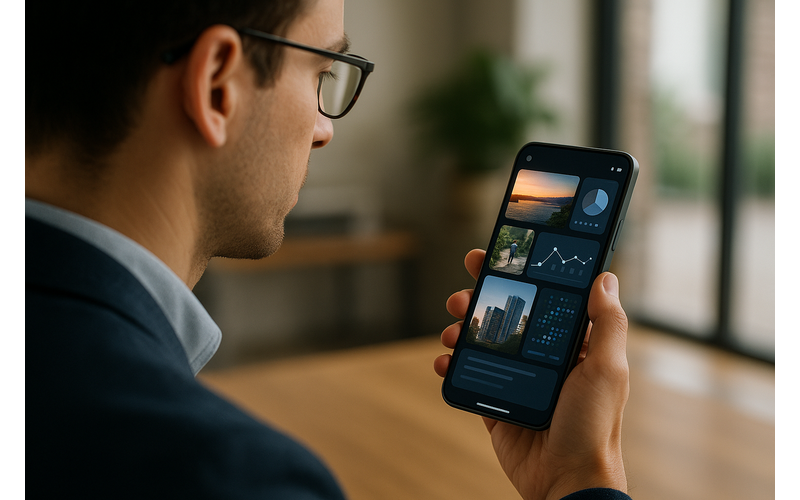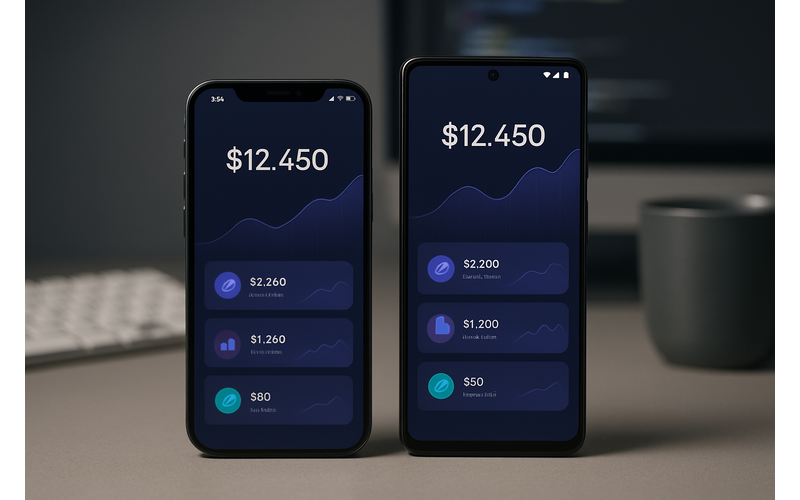The mobile app development landscape continues to evolve at a breathtaking pace, with new technologies, user expectations, and market demands reshaping how businesses approach their mobile strategies. As we look ahead to 2025, several transformative trends are emerging that will define the next generation of mobile applications across iOS, Android, and cross-platform environments.
At Aries Star Marketing OPC, we've been tracking these developments closely through our work with clients across Asia, Europe, and the Middle East. This article explores the most significant mobile app development trends that forward-thinking businesses should be preparing for now.
1. AI-Powered Personalization Reaches New Heights
Artificial intelligence is revolutionizing how mobile apps interact with users, creating deeply personalized experiences that adapt in real-time to individual preferences and behaviors.

AI-driven personalization creates unique user experiences based on behavior patterns
In 2025, we expect to see:
- Hyper-personalized UIs: Interfaces that automatically adjust layouts, content, and functionality based on individual usage patterns
- Predictive features: Apps that anticipate user needs and proactively offer solutions before users even realize they need them
- Emotion recognition: Advanced AI that can detect user emotions through facial expressions, voice patterns, and typing behavior to adjust app responses accordingly
Our recent work with a retail client in the UAE demonstrated how AI personalization increased user engagement by 47% and boosted conversion rates by 32% through dynamically tailored product recommendations and interface adjustments.
2. Super Apps Continue Global Expansion
The super app model—pioneered by platforms like WeChat in China and Grab in Southeast Asia—is gaining momentum worldwide. These all-in-one platforms combine multiple services within a single app ecosystem.
"The future of mobile isn't about having dozens of single-purpose apps, but rather integrated ecosystems that seamlessly connect various aspects of users' digital lives." — Sophia Chen, Mobile Development Lead at Aries Star Marketing OPC
By 2025, we anticipate:
- More regional super apps emerging across Europe, the Middle East, and North America
- Traditional single-purpose apps evolving into mini-ecosystems with expanded functionality
- New partnership models allowing smaller businesses to integrate their services into established super app platforms
3. Advanced AR/VR Integration Becomes Mainstream
Augmented reality (AR) and virtual reality (VR) are moving beyond gaming and entertainment into practical, everyday mobile applications.

AR shopping experiences allow users to visualize products in their own space
Key developments we're tracking include:
- AR-powered shopping: Virtual try-on experiences for clothing, cosmetics, and accessories becoming standard in retail apps
- Immersive training: VR components in professional development and educational apps
- AR navigation: Enhanced wayfinding with visual overlays in travel and transportation apps
- Social AR: Advanced filters and shared AR experiences in social and communication apps
Our team recently developed an AR furniture visualization feature for a European home goods retailer that reduced product returns by 26% and increased average order value by 18%.
4. Cross-Platform Development Reaches New Maturity
The debate between native and cross-platform development is evolving as frameworks like Flutter, React Native, and SwiftUI/Jetpack Compose continue to mature.
In 2025, expect to see:
- Cross-platform frameworks achieving near-native performance across most use cases
- More sophisticated UI capabilities in cross-platform tools
- Improved integration with device-specific features and hardware
- Hybrid approaches that strategically combine native and cross-platform elements

Modern cross-platform frameworks enable efficient development across iOS and Android
At Aries Star Marketing OPC, we've seen development time reduced by up to 40% using advanced cross-platform approaches while maintaining excellent performance and user experience.
5. 5G Unlocks New Mobile Capabilities
As 5G networks become more widespread globally, they're enabling a new generation of mobile experiences that weren't previously possible due to bandwidth and latency constraints.
Innovations we expect to see more of include:
- High-definition streaming: 4K and even 8K video streaming becoming standard in media apps
- Real-time collaboration: Truly synchronous multi-user experiences in productivity and creative apps
- Edge computing integration: Processing-intensive tasks distributed between device and edge servers for better performance
- IoT ecosystem management: Mobile apps serving as control centers for complex networks of connected devices
6. Enhanced Mobile Security and Privacy Features
With growing concerns about data privacy and increasing regulatory requirements worldwide, security is becoming a central focus in mobile app development.
Key security trends for 2025 include:
- On-device AI processing: More AI functions happening locally rather than in the cloud to protect sensitive data
- Advanced biometric authentication: Multi-factor biometric security becoming standard
- Privacy-focused design: Apps built from the ground up with data minimization principles
- Blockchain integration: Decentralized data storage and verification for sensitive information

Advanced security measures protect user data while maintaining seamless experiences
7. Sustainability in Mobile Development
Environmental concerns are influencing mobile app development practices, with a growing focus on creating energy-efficient applications that minimize battery drain and server resources.
Sustainable development practices gaining traction include:
- Energy-efficient coding practices and performance optimization
- Dark mode as default to reduce screen power consumption
- Optimized cloud resource usage to reduce carbon footprint
- Apps that actively promote sustainable behaviors among users
How Businesses Should Prepare
To stay ahead of these mobile app development trends, organizations should consider the following strategies:
- Audit your current mobile strategy against emerging trends to identify gaps and opportunities
- Invest in AI capabilities that can enhance personalization and automate key functions
- Explore cross-platform frameworks to maximize development efficiency without compromising quality
- Prioritize security and privacy as fundamental design principles, not afterthoughts
- Consider how 5G capabilities might enable new features or business models for your organization
- Partner with forward-thinking development teams who stay current with evolving technologies and best practices
Conclusion
The mobile app landscape of 2025 will be characterized by deeper personalization, more immersive experiences, and seamless integration across platforms and services. Organizations that anticipate these trends and adapt their mobile strategies accordingly will be well-positioned to meet evolving user expectations and gain competitive advantage.
At Aries Star Marketing OPC, we help businesses across Asia, Europe, and the Middle East develop future-ready mobile applications that leverage these emerging technologies while delivering exceptional user experiences. Whether you're looking to create a new mobile app or enhance an existing one, our global team of mobile development experts can help you navigate the rapidly evolving mobile landscape.





